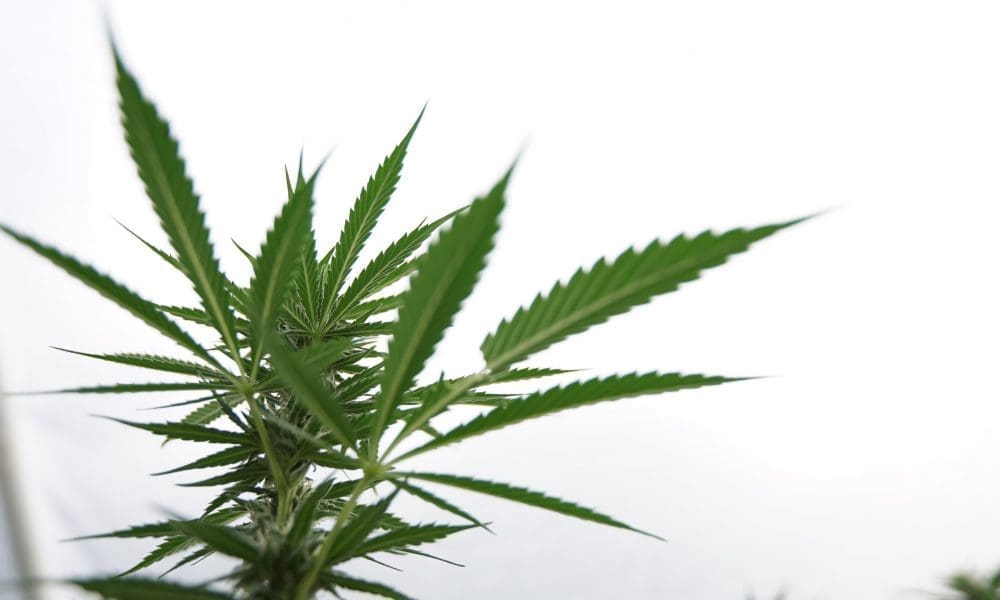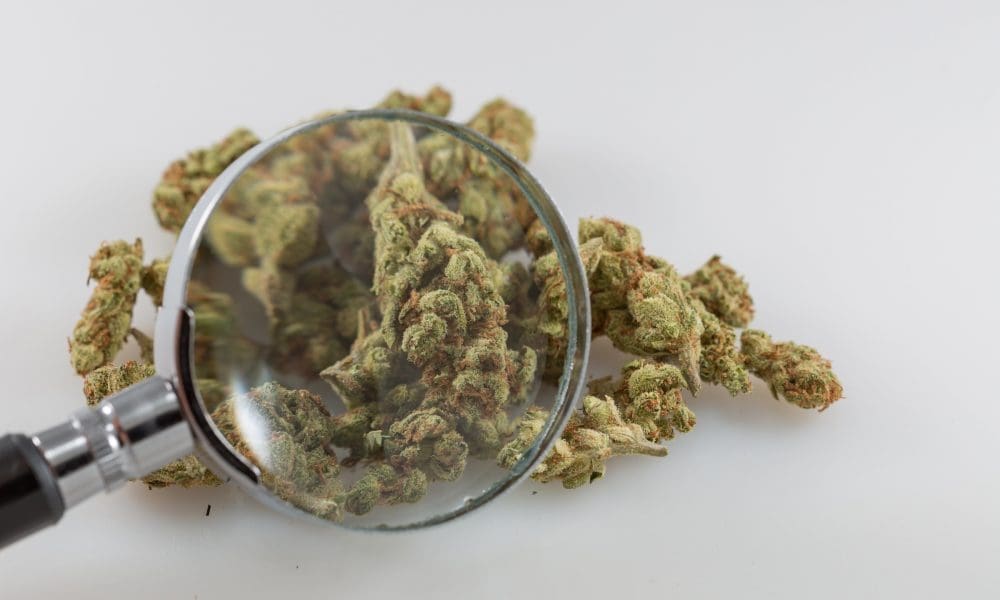featured
Pennsylvania Governor Keeps Pushing For Marijuana Legalization As Top GOP Senator Rules Out Including It In Budget
Published
6 hours agoon

A top Pennsylvania Republican says marijuana legalization will not be included in the 2026 budget as lawmakers approach a deadline he expects they will miss. But Gov. Josh Shapiro (D) is still holding out hope that negotiators can “get it done.”
With the budget due by a constitutionally mandated deadline of June 30, legislators appear to be at an impasse on certain key issues, including the governor’s request to legalize adult-use cannabis via the legislation. Senate Majority Leader Joe Pittman (R) said he doesn’t see a path forward for the reform on that schedule, however.
Shapiro, on the other hand, hasn’t quite thrown in the towel, saying at a press briefing on Wednesday that “we all understand we have to compromise” on a number of issues to reach a budget agreement.
“We also, I think, all understand the set of issues we have to work through—and we’re going to continue to work through them,” he said. “We’re each going to have to give a little bit. We’re going to make progress. We’re going to get it done.”
The governor said that he doesn’t quite understand why GOP lawmakers wouldn’t support enacting legalization given that, in the current policy environment, Pennsylvanians are simply traveling to neighboring legal states to buy cannabis while contributing tax revenue to those other jurisdictions.
“Every state around us, with the exception of West Virginia, has legalized,” Shapiro said, “and Pennsylvanians are driving into those states in order to purchase cannabis legally—and pay taxes to those states so those school kids get more money for their schools, their parks and roads and bridges get repaired, their mass transit systems get funded, their housing stock gets replenished.”

“I’m not sure why we want to do that for the good people of Ohio or New York or Maryland or New Jersey, when we should be doing it for people here in Pennsylvania,” the governor said. “I think it’s a competitiveness issue. Its time has come… I hope we’re able to find a way to get that done.”
Responsible PA, an industry advocacy group backing legalization, said in response to Pittman’s comments on omitting cannabis reform from the budget that there’s “no viable path to passing a balanced budget without cannabis revenue on the table.”
“There’s a funding gap with few realistic alternatives to close it. Not only does the budget need cannabis revenue, but Pennsylvanians overwhelmingly support it,” the group said. “Polling shows 68 percent of voters back legalization—rising to 74 percent once they learn more about the issue.”
“That support cuts across party lines, age groups, and every corner of the Commonwealth,” they said. “The pressure is mounting. The time for delay and posturing is over. The legislature must act now to legalize cannabis—delivering what voters want while generating the revenue Pennsylvania needs.”
Outside of the budget, the House did narrowly pass a marijuana legalization bill that would have involved state-run shops, but it was quickly rejected by a Senate committee.
Following that defeat, the governor said he still remained “hopeful” that lawmakers could deliver a reform bill to his desk by a budget deadline at the end of this month—and he urged the GOP-controlled Senate to “put their ideas on the table.”
“We’ve had really good, honest dialogue about it,” the governor, who separately criticized the Senate for abruptly derailing the House marijuana legalization bill, said.
“Look, I think this is an issue of competitiveness,” he said. “Every state around us, with the exception of West Virginia, has gotten it done. You go visit some of these dispensaries along our border—in this case with Maryland, [that] is probably the closest one here. Sixty percent of the people walking into those dispensaries are from the Commonwealth of Pennsylvania.”
Whether Pennsylvania legislators will advance legalization this session remains to be seen. But two Democratic lawmakers—Sen. Sharif Street (D) and Rep. Rick Krajewski (D)—recently said they’re aiming to reach a compromise and pass reform legislation before the budget deadline.
Also, last month Sen. Marty Flynn (D) announced his intent to file a new bill to legalize marijuana in the state, calling on colleagues to join him on the measure.
While the House legislation Krajewski sponsored alongside Rep. Dan Frankel (D) was rejected in a Senate committee following its expedited passage through the House along party lines, Street said he’s “cautiously optimistic we’re going to be able to revive the bill and amend it and move forward with a work product that allows us to get a bill on the governor’s desk and realize revenue.”
That said, Sen. Dan Laughlin (R), who has sponsored legalization legislation with Street, recently seemed to suggest that lawmakers should pump the brakes on the push to enact the policy change amid resistance to reform within his caucus and instead pass a bill to create a new regulatory body that can begin overseeing medical cannabis and hemp while preparing to eventually handle the adult-use market as well.
“I remain committed to crafting a cannabis bill that can pass the Senate and be signed into law to benefit all Pennsylvanians,” Laughlin said. “That starts with honest dialogue from everyone involved, including House leadership and the governor, to develop a realistic approach–not political theater.”
Following the Senate committee vote, lawmakers from both chambers who support legalization have been trading criticisms about each other’s roles in the stalled push to end prohibition.
Krajewski, for example, recently wrote in a Marijuana Moment op-ed that Senate Republicans who killed his House-passed cannabis legalization bill are “stuck in their prohibitionist views of the past” and are “out of touch with the will of our Commonwealth.”
Prior to that vote, Pennsylvania’s Republican attorney general said that while he doesn’t currently support the House-passed marijuana legalization bill, he’s open to changing his mind about the policy change after continuing to review the details.
For what it’s worth, a recent poll found that Pennsylvania voters say they favor a model where cannabis is sold by licensed private businesses, rather than through a system of state-run stores.
The governor has repeatedly called for adult-use marijuana legalization. However, he hasn’t endorsed the specific idea of having a state-controlled model.
Rep. Abby Major (R)—who is sponsoring another forthcoming legalization bill that envisions a traditional private sales model alongside Rep. Emily Kinkead (D)—said during the House floor debate on HB 1200 that she stands opposed to the competing bill, emphasizing that she disagrees with the state-run stores proposal.
While Democrats control the House and governor’s office, they will still need to reach a deal with the GOP-controlled Senate to effectuate change. And in addition to the conflicting perspectives among pro-legalization legislators, another potential barrier to reform is exactly that political dynamic.
Regardless of which direction Pennsylvania lawmakers do—or don’t—go on marijuana legalization this session, a survey released in April shows a majority of adults in the state support the reform—and opposition to the policy change has fallen by nearly 50 percent over the last decade.
Kinkead has made the case in another recent interview that legalizing cannabis in Pennsylvania will help the state mitigate public health and safety concerns associated with the illicit market, including the fact that unregulated products can be laced with fentanyl.
The lawmaker previously introduced a separate bipartisan marijuana legalization bill, alongside 15 other cosponsors, last September. It did not advance, however.
Meanwhile, Laughlin recently called for the creation of a state “legacy” fund, using tax revenue from adult-use marijuana sales and gaming to make long-term investments in the Commonwealth’s economy.
The senator argued that, beyond using any resulting tax revenue to fund day-to-day projects and public services, the state should earmark a portion of those tax dollars for a fund to “provide a sustainable source of prosperity that lasts for generations.”
Another GOP Pennsylvania senator, Sen. Gene Yaw (R), is backing the push to legalize marijuana in the commonwealth, pointing out that, historically, prohibition “has not turned out well,” noting the country’s experience with alcohol criminalization.
Pennsylvania House Speaker Joanna McClinton (D) recently said that Democrats are ready to pass a marijuana legalization bill this session, but that the party “will need Republican support” to get the job done—adding that it will be a “heavy lift.”
Polls have shown bipartisan support for legalization among voters, but the reform has consistently stalled in the legislature, owing in large part to GOP opposition. But not all Republican members are against the policy change—and one recently said she felt her party should seize the “opportunity to snatch” the issue from Democrats.
Separately in March, the Pennsylvania House approved a bill sponsored by Frankel that’s meant to strengthen safety standards and oversight of the state’s medical marijuana program as lawmakers work to advance adult-use legalization.
While Pennsylvania’s medical cannabis program was enacted nearly a decade ago, lawmakers say the measure, which now heads to the Senate, is necessary to improve testing compliance, product audits and lab inspections, among other aspects of the industry.
Meanwhile, Pennsylvania Democratic lawmakers recently introduced a bill that would allow farmers and other small agriculture operators to sell marijuana they cultivate to existing growers and and processors if the state moves to legalize adult-use cannabis.
Separately, an independent Pennsylvania agency is projecting more tax dollars to be generated from adult-use marijuana sales compared to what the governor’s office has estimated, although it expects significantly less overall revenue from cannabis legalization due to differing views on licensing fees.
Pennsylvania officials have also launched a new survey that invites legal marijuana businesses across the country to provide information about their operations to help the state better understand the cannabis industry as lawmakers consider enacting adult-use legalization this session.
—
Marijuana Moment is tracking hundreds of cannabis, psychedelics and drug policy bills in state legislatures and Congress this year. Patreon supporters pledging at least $25/month get access to our interactive maps, charts and hearing calendar so they don’t miss any developments.![]()
Learn more about our marijuana bill tracker and become a supporter on Patreon to get access.
—
Also, in a video interview released in March, the governor emphasized that the state is “losing out” to others that have already enacted adult-use legalization, while maintaining a policy that’s enriched the illicit market.
“I think it’s an issue of freedom and liberty. I mean, if folks want to smoke, they should be able to do so in a safe and legal way,” he said. “We should shut down the black market—and, by the way, every state around us is doing it. Pennsylvanians are driving to those other states and paying taxes in those other states.”
The state’s agriculture secretary separately told lawmakers that he’s fully confident that his department is in a “really good” position to oversee an adult-use marijuana program if lawmakers act.
Meanwhile, in February, top Pennsylvania police and health officials told lawmakers they are prepared to implement marijuana legalization if the legislature moves forward with the reform—and that they stand ready to work together as the details of legislation to achieve it are crafted.
Amid the growing calls for marijuana legalization in Pennsylvania, a GOP state senator said prohibition has been a “disaster,” and a regulated sales model for cannabis—similar to how alcohol and tobacco are handled—could serve as an effective alternative.
A Republican Pennsylvania senator also recently defended the push to legalize and regulate marijuana, calling it “the most conservative stance” on the issue.
Photo courtesy of Chris Wallis // Side Pocket Images.

Author: mscannabiz.com
MScannaBIZ for all you Mississippi Cannabis News and Information.
You may like
-


Ohio GOP Lawmakers Can’t Agree On How To Amend Marijuana Law, Causing Planned Vote To Be Canceled
-


Police reveal identities of cannabis smoking school girls in viral video
-


Nebraska AG Cracks Down on Hemp Stores, Says 90% of Products Inaccurately Labeled
-


How DC's medical cannabis industry is evolving
-


California Is Using $30 Million In Marijuana Revenue To Support Research On Consumer Preferences, Crop Yields And Sustainability
-


California DCC Announces $30M in Grant Funding to Advance Cannabis Research
featured
Ohio GOP Lawmakers Can’t Agree On How To Amend Marijuana Law, Causing Planned Vote To Be Canceled
Published
3 minutes agoon
June 19, 2025
Despite efforts in the Ohio legislature to pass a bill to significantly change the state’s voter-approved marijuana law, last-minute disagreements between the House and Senate Republicans seemed to have derailed that plan for now—with House lawmakers signaling that a deal won’t be struck before the summer recess.
After taking public testimony and adopting certain changes to the Senate-passed legislation, SB 56, in recent weeks, the House Judiciary Committee ultimately declined to advance the proposal as scheduled at a Wednesday hearing, making it so the measure couldn’t advance to a floor vote planned for that day. Evidently, the revisions didn’t sit well with key senators, according to several legislators.
“Apparently the Senate changed their mind,” Rep. Jamie Callender (R), a pro-legalization lawmaker, told News 5 Cleveland.
Changes approved at a hearing late last month, for example, rolled back some of the strict limits included in a version of the measure passed by the Senate in February, including a criminal prohibition on sharing marijuana between adults on private property.
“They wanted to make a mandatory jail sentence for passing a joint between friends,” Callender, who has spent weeks working on additional changes to the legislation, said. He also complained about the Senate’s proposal to put all cannabis tax revenue in the state’s general fund, which would have prevented local municipalities from getting a share of those dollars as is currently the law.
“The Senate had proposed taking that tax away, and the House has fought really hard to keep that in,” the lawmaker, who was one of the first people to buy legal recreational marijuana products in Ohio when sales launched last year, said. “We finally had that negotiated so it would stay in.”
In March, a survey of 38 municipalities by the Ohio State University’s (OSU) Moritz College of Law found that local leaders were “unequivocally opposed” to earlier proposals that would have stripped the planned funding.
While some have characterized the Senate’s pulled support as a spontaneous wrinkle in an agreed-upon deal between the chambers, Senate President Rob McColley (R) said “there was a misunderstanding as to where we might have been on the bill as both chambers.”
House Speaker Matt Huffman (R), who formerly served as Senate president, said he was “pretty disappointed” the Judiciary Committee wouldn’t be taking up the legislation on Wednesday due to the other chamber’s disagreement.
“To my surprise, there was a whole new set of issues, additional issues, which were raised Monday night by the Senate regarding what we were trying to do,” he said.
Where that leaves the legislation is yet to be seen. But while McColley said he would still “like to get something done by the end of June” and believed Huffman felt the same, the House speaker tempered those expectations, saying he’s “not very optimistic” about that prospect.
“I just told my caucus: ‘We’re not going to just say OK because we’re so anxious to pass the marijuana bill,’ which I’d like to get it done, but we’re not going to give up House priorities to do that,” Huffman said.
“I thought we were on a path, this time last week, to pass it [this week]. That was the kind of clear indication we had,” Huffman said. However, despite that clear indication, he also said “There was no agreement [with the Senate] to pull out of.”
“We were hoping that there would be, anticipating there would be, sounded like we might have—but it’s not correct to say that there was an agreement that anybody pulled out of,” he said.
Sen. Steve Huffman (R), a relative of the speaker and main negotiator on the Senate side of the marijuana debate, disagreed on that point.
“We were in an agreement,” he said. “I believe that things are still being worked out, and I have the utmost confidence that we will resolve this by next Wednesday.”
Callender said he doubted that, stating that he expected that the Senate would continue to hold the line on attempts to revise the law in a way that conflicts with the will of voters who approved legalization in 2023.
—
Marijuana Moment is tracking hundreds of cannabis, psychedelics and drug policy bills in state legislatures and Congress this year. Patreon supporters pledging at least $25/month get access to our interactive maps, charts and hearing calendar so they don’t miss any developments.![]()
Learn more about our marijuana bill tracker and become a supporter on Patreon to get access.
—
Meanwhile in Ohio, adults are now able to buy more than double the amount of marijuana than they were under previous limits, with state officials determining that the market can sustainably supply both medical cannabis patients and adult consumers.
A budget measure from Gov. Mike DeWine (R) is also a potential vehicle for changes to the state’s marijuana law. As proposed, it would remove local tax allocations of medical marijuana revenue and double the state cannabis tax rate to 20 percent—though legislative leaders have said they will be removing the tax increases.
Meanwhile, DeWine in March announced his desire to reallocate marijuana tax revenue to support police training, local jails and behavioral health services. He said funding police training was a top priority, even if that wasn’t included in what voters passed in 2023.
Ohio’s Senate president has also pushed back against criticism of the Senate bill, claiming the legislation does not disrespect the will of the electorate and would have little impact on products available in stores.
Separately, lawmakers are considering legislation to restrict intoxicating hemp products.
DeWine has repeatedly asked lawmakers to regulate or ban intoxicating hemp products such as delta-8 THC.

Author: mscannabiz.com
MScannaBIZ for all you Mississippi Cannabis News and Information.
featured
Nebraska AG Cracks Down on Hemp Stores, Says 90% of Products Inaccurately Labeled
Published
1 hour agoon
June 19, 2025
Nebraska Attorney General Mike Hilgers ramped up his fight against retailers selling intoxicating hemp products through 82 more cease-and-desist letters sent June 18 to businesses in Lincoln.
The state’s top legal officer claimed the stores are selling products containing noncompliant amounts of THC or unlawful synthetic cannabinoids. This week’s letters sent to businesses in the state’s capital follow 104 letters that Hilgers’ office sent in March to similar stores operating in Omaha.
To date, the attorney general’s office has sent cease-and-desist letters to 204 stores statewide, alleging that they’re violating the Nebraska Consumer Protection Act for unfair and/or deceptive practices, and that they’re violating the state’s Uniform Deceptive Trade Practices Act and Nebraska Pure Food Act.
“Our office’s testing showed that nearly every one of these products were mislabeled,” Hilgers said about products his office and the Lancaster County Sheriff’s Office purchased from stores owned by 39 different companies. “
“This industry has shown itself to be completely irresponsible,” he said. “It operates without regard to the health or safety of Nebraskans by selling these poisonous and mislabeled products into the capital city.”
Hilger’s office demanded that each store sign a settlement document indicating their assurance of voluntary compliance to cease all sales of THC-containing products or face litigation. The stores have 30 days to comply with the demands.
Each store that the sheriff and attorney general’s offices investigated had at least one product marketed as hemp that was over the 0.3% delta-9 THC limit, qualifying as cannabis, according to Hilger. In addition, more than 90% of the products had inaccurate labels, according to his office.
“This lack of proper labeling means that the stores are engaging in deceptive, unfair and unsafe trade practices, and also engaging in the sale of controlled substances,” according to Hilger’s office. “Many of the stores have tobacco licenses and also sell synthetically produced THC-containing products, which may put their tobacco licenses at risk.”
Selling any amount of cannabis in Nebraska is a felony punishable by up to 20 years in prison with a $25,000 maximum fine.
Hilgers indicated in March that his office plans to seek maximum penalties and fines against retailers selling noncompliant products containing intoxicating hemp derivatives, including up to a $4,000 fine for each individual sale of a noncompliant product.
The attorney general’s enforcement efforts come after the Nebraska Legislature failed to pass legislation, Legislative Bill 316, that Sen. Kathleen Kauth, R-Omaha, sponsored in an attempt to redefine hemp, prohibit certain products containing the plant’s derivatives, and regulate serving sizes to 10 milligrams of total THC per package.
Kauth told Nebraska Public Media that she supports Hilgers’ actions.
“Hopefully, more stores will say, ‘Hey, listen. Oh, guess what? We shouldn’t be selling this,’ or ‘We’ve heard stores that are very much like ours are getting hit with these letters and are having to rush to get stuff off of their shelves. Let’s start winding down,’” Kauth told the news outlet.

Author: mscannabiz.com
MScannaBIZ for all you Mississippi Cannabis News and Information.
featured
California Is Using $30 Million In Marijuana Revenue To Support Research On Consumer Preferences, Crop Yields And Sustainability
Published
2 hours agoon
June 19, 2025
California officials are inviting research proposals for a second round of grants under a program meant to better educate the public on the state’s marijuana law and help policymakers make informed decisions on the issue.
For the new $30 million round of the grant program, which is funded by marijuana tax revenue, the Department of Cannabis Control (DCC) said it is prioritizing proposals in research areas including educational methods of improving public health and safety, crop yields, state and local marijuana policies, consumer preferences, environmental sustainability and other topics.
“At a time when the federal government is pulling back funding for cannabis-related research, California is stepping up,” DCC Director Nicole Elliott said in a press release on Thursday.
To that point, the Trump administration has promoted funding cuts to certain cannabis-related research initiatives, including those impacting California institutions.
“DCC is proud to partner with California’s world-class public universities to generate the data and insights necessary to inform thoughtful policy, protect public health, and guide the evolution of this industry responsibly,” Elliott said. “These impacts don’t stop at our borders—what the Department learns here will shape important conversations and policies across the nation.”
This latest round of $30 million in grants brings the state’s total research-focused contributions to $80 million, DCC said. One of the earlier rounds, in 2023, focused on studies investigating novel cannabinoids like delta-8 THC, the genetics of “legacy” strains from the state and monopolies and unfair competition in the market.
Meanwhile, last month, the Governor’s Office of Business and Economic Development (GO-Biz) announced the recipients of over $52 million in community reinvestment grants to nonprofits and local health departments, also funded by marijuana tax revenue.
That marked the seventh round of cannabis-funded California Community Reinvestment Grants (CalCRG) under the state program.
Legalization in California has created a number of new grant programs aimed at addressing the consequences of marijuana prohibition and attempting to nurture a strong, well-regulated legal industry.
—
Marijuana Moment is tracking hundreds of cannabis, psychedelics and drug policy bills in state legislatures and Congress this year. Patreon supporters pledging at least $25/month get access to our interactive maps, charts and hearing calendar so they don’t miss any developments.![]()
Learn more about our marijuana bill tracker and become a supporter on Patreon to get access.
—
Separately, earlier this month the California Assembly unanimously approved a bill to delay the implementation of an planned hike on marijuana taxes.
California’s Supreme Court separately delivered a victory for the state’s marijuana program last month, rescinding a lower court ruling in a case that suggested federal prohibition could be used locally to undermine the cannabis market.
The state Supreme Court ruling also came just weeks after California officials unveiled a report on the current status and future of the state’s marijuana market—with independent analysts hired by regulators concluding that the federal prohibition on cannabis that prevents interstate commerce is meaningfully bolstering the illicit market.
Gov. Gavin Newsom (D) did sign a bill in 2022 that would have empowered him to enter into interstate cannabis commerce agreements with other legal states, but that power was incumbent upon federal guidance or an assessment from the state attorney general that sanctioned such activity.
Meanwhile, a California Senate committee recently declined to advance a bipartisan bill that would have created a psilocybin pilot program for military veterans and former first responders.
New Hampshire Lawmakers Advance Psilocybin Penalty Reform But Reject Medical Marijuana Homegrow

Author: mscannabiz.com
MScannaBIZ for all you Mississippi Cannabis News and Information.

Ohio GOP Lawmakers Can’t Agree On How To Amend Marijuana Law, Causing Planned Vote To Be Canceled

Police reveal identities of cannabis smoking school girls in viral video

Nebraska AG Cracks Down on Hemp Stores, Says 90% of Products Inaccurately Labeled

How DC's medical cannabis industry is evolving

California Is Using $30 Million In Marijuana Revenue To Support Research On Consumer Preferences, Crop Yields And Sustainability

California DCC Announces $30M in Grant Funding to Advance Cannabis Research

Federal Bill Would ‘Effectively’ Ban All Consumable Hemp Products—’Including CBD’—Congressional Researchers Say

Watch: Police bodycam captures £700k cannabis raid

Texas Hemp Advocates Nearing 150,000 Signatures Urging Gov. Abbott to Veto SB 3

Minnesota hands out 1st cannabis business license

Pennsylvania Governor Keeps Pushing For Marijuana Legalization As Top GOP Senator Rules Out Including It In Budget

Congress can reschedule cannabis more quickly than DEA, report says (Newsletter: June 19, 2025)

Wildfire Smoke, Increase in Marijuana Use

Delaware Lawmaker Pulls Bill to Restrict Intoxicating Hemp Products

Dozens arrested as federal agents, soldiers raid marijuana farms in Southern California

Hemp Companies Sue Maryland Over Cannabis Licensing

Missouri Hemp Groups Seek to Deregulate Cannabis via Ballot Initiative

First cannabis license issued to Minnesota business | Video

Wichita Falls woman charged for mailing synthetic cannabis in Bibles to inmates

Trump’s VA Head Visits Psychedelics Research Center, Reiterating ‘Promise’ To Explore Benefits For Military Veterans
Access Denied

Lawmakers Could Reschedule Marijuana With ‘Greater Speed And Flexibility’ Than Administration Officials, Congressional Researchers Say

Aurora Cannabis reduces Q4 net loss

Trump’s Pollster Says Texas Hemp Ban Bill Faces ‘Bipartisan Opposition’ From Voters As Governor Nears Deadline To Act

Alert: Department of Cannabis Control updates data dashboards with full data for 2023

Connecticut Appoints The US’s First Cannabis Ombudsperson – Yes there is a pun in there and I’m Sure Erin Kirk Is Going To Hear It More Than Once!

5 best CBD creams of 2024 by Leafly

Free delta-9 gummies from Bay Smokes

EU initiative begins bid to open access to psychedelic therapies
New Study Analyzes the Effects of THCV, CBD on Weight Loss

Mississippi city official pleads guilty to selling fake CBD products

Curaleaf Start Process Of Getting Their Claws Into The UK’s National Health System – With Former MP (Resigned Today 30/5/24) As The Front Man

May 2024 Leafly HighLight: Pink Runtz strain

Horn Lake denies cannabis dispensary request to allow sale of drug paraphernalia and Sunday sales | News

5 best autoflower seed banks of 2024 by Leafly

Discover New York’s dankest cannabis brands [September 2024]

Press Release: CANNRA Calls for Farm Bill to Clarify Existing State Authority to Regulate Hemp Products

Nevada CCB to Accept Applications for Cannabis Establishments in White Pine County – “Only one cultivation and one production license will be awarded in White Pine County”

Local medical cannabis dispensary reacts to MSDH pulling Rapid Analytics License – WLBT

The Daily Hit: October 2, 2024

6 best CBD gummies of 2024 by Leafly

5 best THC drinks of 2024 by Leafly

5 best delta-9 THC gummies of 2024 by Leafly

Weekly Update: Monday, May 13, 2024 including, New Guide for Renewals & May Board meeting application deadline

People In This State Googled ‘Medical Marijuana’ The Most, Study Shows

PRESS RELEASE : Justice Department Submits Proposed Regulation to Reschedule Marijuana

Press Release: May 9, STIIIZY and Healing Urban Barrios hosted an Expungement Clinic & Second Chance Resource Fair

Thailand: Pro-cannabis advocates rally ahead of the government’s plan to recriminalize the plant
Trending
-

 California Cannabis Updates1 year ago
California Cannabis Updates1 year agoAlert: Department of Cannabis Control updates data dashboards with full data for 2023
-

 Breaking News1 year ago
Breaking News1 year agoConnecticut Appoints The US’s First Cannabis Ombudsperson – Yes there is a pun in there and I’m Sure Erin Kirk Is Going To Hear It More Than Once!
-

 best list11 months ago
best list11 months ago5 best CBD creams of 2024 by Leafly
-

 Bay Smokes12 months ago
Bay Smokes12 months agoFree delta-9 gummies from Bay Smokes
-

 Business9 months ago
Business9 months agoEU initiative begins bid to open access to psychedelic therapies
-

 cbd1 year ago
cbd1 year agoNew Study Analyzes the Effects of THCV, CBD on Weight Loss
-

 Mississippi Cannabis News1 year ago
Mississippi Cannabis News1 year agoMississippi city official pleads guilty to selling fake CBD products
-

 Breaking News1 year ago
Breaking News1 year agoCuraleaf Start Process Of Getting Their Claws Into The UK’s National Health System – With Former MP (Resigned Today 30/5/24) As The Front Man



